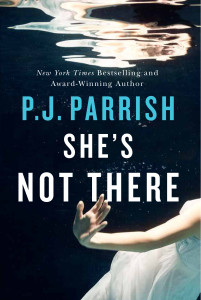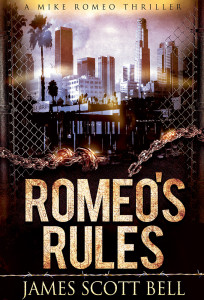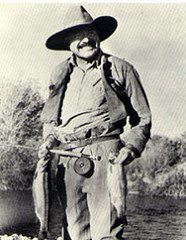
Ernest Hemingway working on his hook.
Analogies about writing, especially about how to write, abound. In my first writing book I beat them to death (because I love analogies), and have since been beaten senseless by some reviewers who don’t care (or know) that analogies are a proven and strategically effective way to teach.
So I was delighted to see Jim Bell’s analogy about playing basketball a couple of weeks ago (and another in the first paragraph yesterday), if nothing else than it allows me to point to him if someone reading TKZ isn’t appreciative of the analogy I am about to offer in today’s post.
Thanks, Jim, for opening that can of worms (itself an analogy, for the record).
All of the analogies I have employed – flying an airplane, playing golf, cooking, building a bridge, a few others – become a thematic chorus when considered en masse. The message is clear, and twofold: professionals can wing it and play loose with the core principles (just like when Michael Jordan shot and made a free throw in an NBA game… with his eyes closed), in a way that less experienced cannot and should not.
At the core of each of these avocations there are unimpeachable truths…
… essential physics that are not to be messed with. When a proven professional does so – and we all do it from time to time… because we can – even a little, they do so in context to an evolved storytelling sensibility and learning curve that a newbie does not yet possess.
In effect, they can do it with their eyes closed, in a way that would make the rest of us look silly.
You don’t tee off with a putter in the name of your art, you don’t under-cook the chicken in the name of table appeal, you don’t build a bridge on sand for obvious reasons, and so on.
The second thing is this: the same is true, every bit as true, for authors who are navigating, cooking up, teeing up, or building a novel. Mess with the core physics of the craft and your story will crash and burn. And when you are rejected, it will most likely be because of an ignorance (as in, to ignore) or a lack of regard (as in, to over-estimate your skills) of the core physics of storytelling.
And so we come to today’s analogy: fishing.
When I was a kid my father took me fishing several times each summer. He selected the tackle, baited the hook, threaded the line, made my casts and, when something nibbled, put his hands on mine as we played the line before setting the hook and reeling in. Then he gave me credit for landing “a big one.” The result was a few fabulous rainbow trout breakfasts and more than a few thrown-back bottom fish, not to mention some of my most precious childhood memories.
There came a point when I was a teenager too cool to fish with my father, so off I went with friends to fish on our own and talk about girls we could not catch from the bank of a river containing fish we could not catch. That period of my fishing life lasted about ten years, when that teen independence gave way to young adult cluelessness.
Over that decade, I caught exactly zero fish. Not one.
Because I was imitating what I had seen my father do for me, and had been too proud or busy or stupid to learn those basics on my own. He smiled when he realized the life lesson to be learned from this failure, a lesson that took years to sink in for me.
I haven’t been fishing since, perhaps disqualifying me from using this analogy at all.
Except… it works.
I can’t help but think about how those fundamentals and processes of fishing are parallel in every way to the experience of learning how to write a novel. How the selection of the story, the way we set it up, the way we play the line and set the hook, are not only essential, but complex and nuanced, not remotely something that can be done without instruction or via imitation.
New writers must be excused from what they don’t yet know, because there is something noble about attempting to learn by doing. At least for a while. But when that takes place in a vacuum, without a parallel experience of learning and apprenticeship, the nobility of it fades away like a fish fleeing from a poorly tied fly.
Most writers come to the intention of writing a novel based upon their reading experience…
… usually joyous, but often riddled with a wildly uninformed belief that they can do what those authors they read can do, or worse, do anything they want – as a reader of novels. Some writers believe this is all you need, that writing is purely intuitive, a misperception reinforced because so many of the authors they’ve read made it look easy.
Logical and functional is not synonymous with easy. Just ask Michael Jordan as he lined up to shoot that free throw with his eyes shut.
Writing stories from this limited base of knowledge is no different that believing you can fly the plane after years of sitting in coach… that you can whip up a killer chicken piccata because you’ve been ordering it for years at the Cheesecake Factory (their best dish, by the way)… that you can hit a nine iron off the tee of a 205 yard par three because that’s what Tiger does… or that you can design and build a functional bridge because you’ve been driving across one for years on your way to work.
Or – I forgot perhaps my favorite analogy, so here goes: You believe that you can take out your own appendix because it took your doctor only fifteen minutes to get that job done. (I smiled when I just saw that Jim used nearly this exact analogy yesterday in the first paragraph of his terrific post; analogies are universal and eternal, and they often speak things more clearly than the direct route can achieve.)
My wife, who is an excellent cook, has for years been trying to nail a chicken piccata that holds a candle to the Cheesecake Factory’s (the recipe for which is not for public consumption), and she’s finally resigned to simply going there to enjoy this dish. Just like we can try to write like Stephen King, using his process (as described in his book, On Writing*), but until you know what he knows, that may not – probably won’t – serve you.
By implication, King is saying that all you need to do is just write. Imagine a surgeon being told, in her first year of med school, that all she needs to do is just cut.
Of course those are silly and obvious comparisons.
And yet, so many writers attempt to write a novel from an equally consumer-focused and over-simplified learning curve (and dare I say, naive), and as a result they inevitably crash, burn, throw up and, like me, fail to catch a single fish for decades or more.
But that’s not you, you’re saying. You attend writing conferences and read all the writing books, maybe even mine and Jim Bell’s.
Which is great, keep going. But ask yourself this: are you truly and deeply internalizing the principles you read there, and are you practicing and applying them in a way that trumps the in-the-moment bliss of storytelling, which is what some writing gurus tell you is the only thing you need to pay attention to?
Do you know the difference between a concept and a premise?
Do you understand the nature of classic story structure, or even believe in it in the first place? Do you know the role of theme in a story? Do you understand what creates drama and suspense, and how to pace it over the arc of the narrative?
Do you believe you can simply make up the forms and standards and processes by which these things are made manifest in your story?
Professional writers know these things, and they just don’t do it any other way than the prescribed and proven way, no matter how they choose to describe their process.
Something to think about the next time it’s just you and a pole on a peaceful afternoon at the river, waiting for the next story to descend upon you from heaven.
*****
*In his book On Writing, King advises writers to take their initial story idea and just sit down and start writing from it, allowing an inner sense of story to help navigate the road leading to the best possible story. He omits, however, to add that this works for him, which by definition could mean that unless and until you know what he knows, the results you achieve may not compare to his, and thus, rendering this among the worst writing advice ever rendered… this being my opinion, of course. I’m no Stephen King, either, but at least I know what a writer must understand before that or any other method of writing a story will bear fruit, or not take you a decade to write, which is why I’m here.
*****
Larry’s new writing book, Story Fix: Transforming Your Novel from Broken to Brilliant” is available now in digital formats on Amazon.com and BN.com, and will be out in trade paperback within the next few weeks. Analogies kept to a minimum, he swears. Visit Larry’s website at http://storyfix.com/.
Flickr photo from Don…The UpNorth Memories Guy… Harrison.
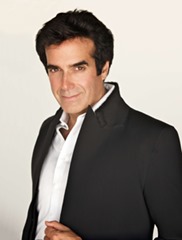 bending feats that astounded the audience including walking through a solid wall. Remember, this is the guy who made the Statue of Liberty disappear, so he kept us on the edge of our seats with every trick.
bending feats that astounded the audience including walking through a solid wall. Remember, this is the guy who made the Statue of Liberty disappear, so he kept us on the edge of our seats with every trick.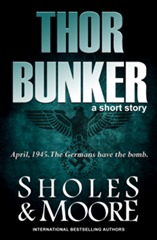 April, 1945. The Germans have the bomb. Download THOR BUNKER, A Short Story prequel to THE TOMB for only 99¢.
April, 1945. The Germans have the bomb. Download THOR BUNKER, A Short Story prequel to THE TOMB for only 99¢.

